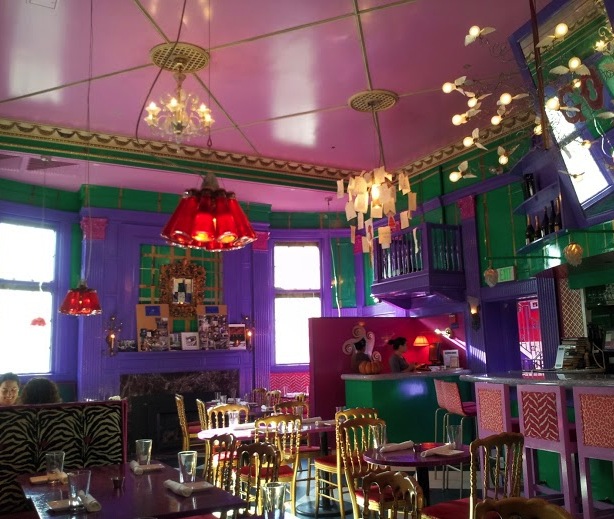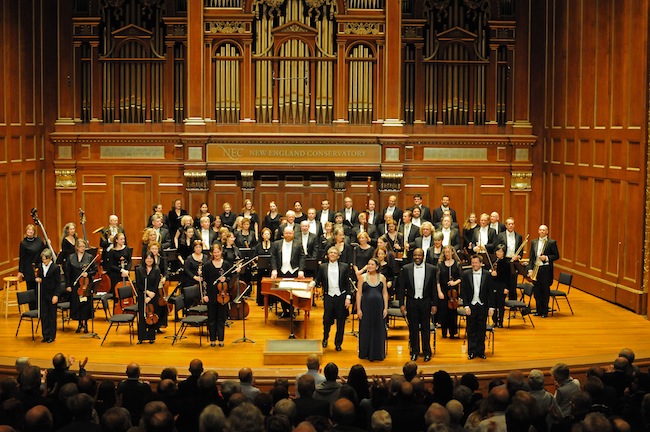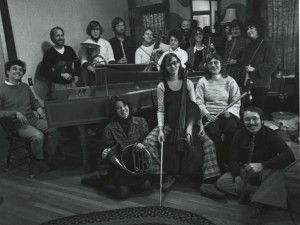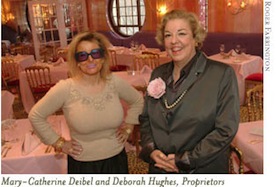Classical Music Feature: A Beautiful Friendship Between Food and Music — Boston Baroque and UpStairs on the Square
Conductor Martin Pearlman and restaurant proprietor Mary-Catherine Deibel talk about their 35 year-old friendship.
by Adeline Sire
Boston Baroque celebrates its fortieth season this year. Last October, this period-instrument orchestra and respected musical institution marked its anniversary in style, in the colorful setting of a sophisticated and respected culinary institution, UpStairs on the Square.
Sadly, this restaurant’s current season — its thirty-first — will also be its last. With its hot pinks, bright greens, zebra prints, and gilded fixtures, UpStairs might be the most ornate and Baroquish locale in the Greater Boston area. But it will take its final bow on New Year’s Eve after gracing Cambridge’s Harvard Square for three decades.
The Winthrop Street building that houses UpStairs is getting a new owner who has plans for a different kind of restaurant. So UpStairs proprietors Deborah Hughes and Mary-Catherine Deibel decided it was time for them to move on. But they had thought of signing-off for a while. “It’s bittersweet,” says Deibel. “I mean it’s so wonderful to say goodbye to everybody, and everybody is coming in to reminisce and things like that. But it’s not like we’re dying. We’re still going to be around,” she says.
Not only will they still be around, but with a lot of her evening time freed up, Deibel says she is looking forward to attending more classical music concerts, including Boston Baroque events. She and Boston Baroque music director Martin Pearlman have been friends for decades. Deibel—and her restaurant—have also been ardent supporters of Boston Baroque. In fact, the two institutions have an intricately connected history of food and music around Harvard Square.
A harpsichordist by training, Pearlman started his early music band in Cambridge in 1973. He called it Banchetto Musicale, Italian for Musical Banquet. Banchetto grew into an orchestra and eventually moved to Boston, where in 1992 it was aptly renamed Boston Baroque.
In the beginning, Pearlman conducted his small band of musicians from the harpsichord. They played their first concerts at University Lutheran Church in Harvard Square. On the other side of the Square, not far from Banchetto’s base, another banquet was taking place, one of the rustic kind. It was a little restaurant called Peasant Stock on Washington Street, in Somerville, where Dalí now stands. Pearlman says it was an interesting place, quite different from UpStairs: “As you can imagine, with the name Peasant Stock, it was not fancy.”
Peasant Stock was a communal kind of restaurant where cooks and musicians sometimes crossed into one another’s territory. It was launched in 1970 by Tesair Lauve and her then husband, Jerry Pierce. The place would serve French-country style wholesome foods like Coq-au-Vin, Bœuf Bourguignon, freshly-made pâté, and cabbage and cheese soup, and branched out into other cuisines as it grew. “It was popular with musicians partly because it had a back room where they played concerts occasionally,” recalls Pearlman.
Lauve, a music lover and harpsichordist, had many friends in the blossoming early music scene and quickly began organizing concerts in her eatery’s back room with musicians from the area, including Banchetto’s folks. Pearlman himself did not play there but many, like violinist Daniel Stepner (who played with the group at the time), and his wife, viola player Laura Jeppesen, did so. Lauve believes that for musicians “it was a chance to play in a real chamber music situation in a small room, where the audience was listening attentively.”
Mary-Catherine Deibel knows a thing or two about those concerts. A student at the time, she was working at Peasant Stock where she oversaw many things, including live music. “We called it the back room series. Actually Yo Yo Ma performed there, and lots of people from the Camerata, lots of people from Boston Baroque and lots from the BSO,” she recalls.
Anne Azéma, Artistic Director of the Boston Camerata, sang in that back room a few times in the 1980s. “We were paid with meal coupons,” she remembers, “I still have one of those in my drawer.” Lauve came up with a Provençal chicken stew named in honor of the band, “Pollo Camerata.” In 1974, Azéma’s husband Joel Cohen—who conducted the Camerata before her—put on a concert of pre-Elizabethan music in Boston. The program was entitled “England before Elizabeth.” “Peasant Stock came up with a menu of medieval English dishes for that occasion,” he says. Azéma also remembers a particularly good dessert, a chocolate mousse referred to as “Pot de Crème.”
Equipped with Peasant Stock’s live music management experience and the support of Banchetto’s musicians, Deibel was ready to take on Banchetto Musicale’s future. In 1978, she interviewed for a position as business manager for the orchestra. Even though they been under the same roof at Peasant Stock, Pearlman and Deibel met face to face for the first time on this occasion.
He remembers that Deibel stood out among applicants because she had an energetic and bubbly kind of personality. “She seemed to be more devoted to music in the area, and she knew more about it [than other candidates], partly through her experience at Peasant Stock, and also knowing the musicians,” he says. She was hired and remained on the job for three years. “For us it was a long time,” states Pearlman, “because it was such an underpaid overworked job, part-time, that there was just a very high turnover, almost every year. So it was a big deal that she was there for several years.” And, he adds, “she was also the one who moved us to Jordan Hall.”
That hop across the river to New England Conservatory’s Jordan Hall was a major profile boost for the group. “Our subscriptions jumped enormously,” recalls Pearlman. Make that tenfold, from forty to four hundred. They had arrived. “There was certainly I guess a kind of cachet [attached to] a big concert hall,” he says. So Deibel got huge credit for this move. She, in turn, credits the longevity of the orchestra to Pearlman: “Marty was very smart about deciding to grow his organization and recruit a new board at the right time.”
1981 was a banner year for Banchetto Musicale. In the spring, they performed Bach’s Mass in B minor, which Pearlman says showed the ensemble could master a challenging performance on period instruments. He says it turned out to be one of the orchestra’s “breakthrough moments.” They then went on to open the very first Boston Early Music Festival with their first opera, Monteverdi’s Poppea, and in December, they produced their first Messiah, which became a holiday season tradition in Boston.
But that year, Deibel’s passion for food and hosting took over, and she left her music manager job to become a restaurant manager. In 1982, she and co-owner Deborah Hughes—a dear friend with whom she had started at Peasant Stock—launched UpStairs at the Pudding on Holyoke Street. The restaurant moved two decades later to their current venue on Winthrop.
But Pearlman and Deibel stayed in touch. In fact, in 1992 Pearlman played harpsichord at Deibel’s wedding in a small Cambridge church. Over the years, Pearlman would dine at Deibel’s restaurant and she would attend Boston Baroque’s galas and matinee concerts, especially The Messiah. They helped each other cross-promote.
Reflecting on her thirty-one years in this business venture, Deibel says it’s been a long journey and she is ready for a change. Whatever she launches into next, she intends to stay near Harvard Square and “hopefully coming back into the arms of classical music in some form,” she says. Looking at this new chapter in her life, she states that it’s just like when she quit her job at Boston Baroque for the risky undertaking of managing a restaurant: “It’s venturing out there and doing something different, something new, so it has come full circle in that sense.”
Pearlman says UpStairs on the Square has a special meaning for him, one connected to his and his friends’ personal and professional growth. “We were all, in the early days—I certainly, and Mary-Catherine, and a lot of people that I knew—oriented around Harvard Square as our home base, and that’s where Boston Baroque started,” he says. “So when she became a major element of the scene, opening a very fine restaurant there, that was also really connected to the musical community, and that was part of the character of Harvard Square for me, and for a lot of us,” he says. “So it does feel like the end of an era in a way.”
There are only a few days left to sample UpStairs’ Pattypan Squash Salad with smoked royal trumpet mushrooms, Cumin-Crusted Lamb, or Semolina Greek Yogurt Cake with blueberries and corn ice-cream, and many more palate-pleasing treats.
Boston Baroque performs Handel’s Messiah tonight and tomorrow night, but Deibel will have to take a rain-check because she will be busy greeting nostalgic restaurant customers.
As for the night of December 31st, Deibel and Pearlman will also be solidly booked in their respective duties. The orchestra will perform its traditional New Year’s Eve concert at Sanders Theater, while steps away, UpStairs on the Square toasts its grand finale in gilded, zebra, and hot pink style, in Harvard Square.
Adeline Sire is an independent arts journalist and radio producer specializing in music and culture, in the Boston area. She is a contributor to the quarterly magazine Early Music America and worked as a producer for the BBC/PRI/WGBH international news program The World for 13 years. Adeline was a fellow of the USC Annenberg / Getty Arts Journalism Program in 2008, and a fellow of the NEA Arts Journalism Institute in Classical Music and Opera in 2009. Twitter: @AdelineSire
Tagged: Banchetto Musicale, Boston Baroque, Deborah Hughes, Martin Pearlman, Mary-Catherine Deibel






The loss of music at Upstairs need not be the end of chamber music “off the pedestal”. The New England chapter of Classical Revolution is looking for a home base and brings a wide base of music and musicians to share with folks who avoid formal concerts. When I’m in Boston I bring an amp system so we can play in larger rooms so everyone can hear the fun, get introduced to the basics of classical and interview players. The work of CR is especially important today to plant the seeds of openness to classical within young adults where they discover other music. I just won a Knight Foundation challenge grant to do this in one city.
Rick, I am familiar with the work of Classical Revolution, which is fabulous and much needed, and I wish you luck with your project. But if you read the story above, you will realize that it is absolutely not about the loss of chamber music, “off the pedestal” or anything else, since this is about a celebrated restaurant that just closed, and an orchestra doing, in fact, very well in its 40th season.
Oh, I’m terribly sorry, Adeline… from the opening paragraph, I got the idea that Boston Baroque had some musical events at Upstairs on the Square. Wishful thinking on my part. Well, thank you for the well wishes. I’m happy you wrote about the story of Boston Baroque. May they always continue. The Peasant Stock musicales were ending when I got to Boston. A Far Cry has begun a bar series called The Happy Hour(?). I hope classical fun like this will shake off the stigmas that hold about classical music.